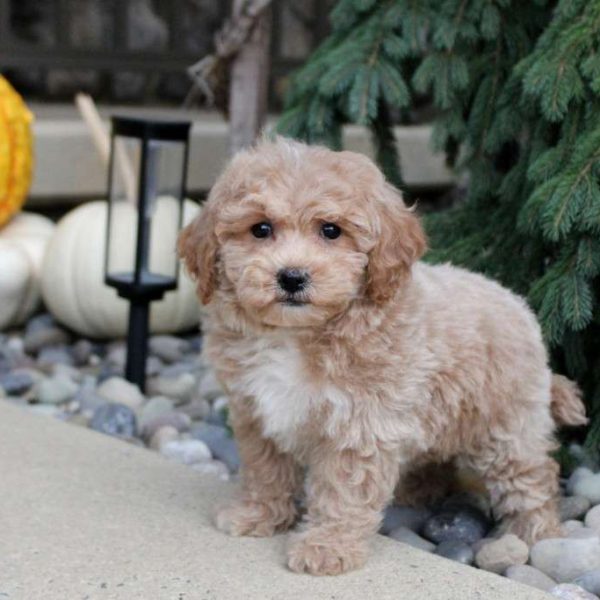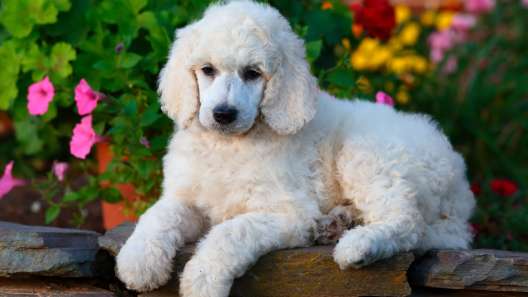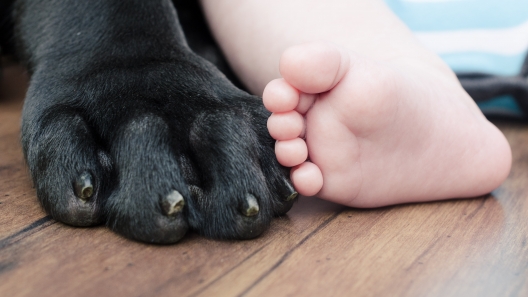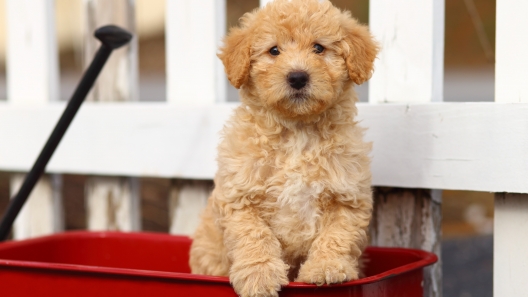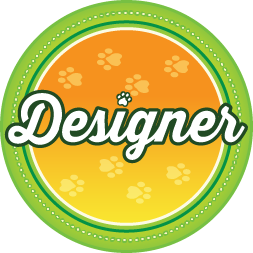
-
Activity Level:
moderate
-
Shedding Level:
low
-
Grooming Level:
high
-
Trainability:
high
-
Good for Novice Owners:
high
-
Adaptability:
high
-
Kid/Pet Friendly:
often
-
Prey Drive:
low
-
Watchdog:
aware
- Average Size: Small
- Average Lifespan: 12-15 years
- Registered?: other
Bich-Poo Dog Breed Information
Overview
Temperament
Adaptability
Health
Owner Experience
Grooming
Activity Level
Size
Life Span
The Bich-Poo is a cross between a Bichon Frise and a Miniature Poodle. They are also sometimes referred to as a Bichpoo, Poochon, or a Bichon Poodle. This mix originated in Australia and started appearing in the late 1990s. The goal was to breed a low or non-shedding dog that was sturdy and active with a temperament that would fit well in families with children.
Although not currently recognized by the American Kennel Club, the Bich-Poo is recognized by other canine clubs and dog registries. The American Canine Hybrid Club (ACHC) recognizes the Bich-Poo. The Designer Dogs Kennel Club and Designer Breed Registry recognize them as a Poochon. The International Designer Canine Registry recognizes this breed under both Poochon and Bichpoo.
Well-socialized Bich-Poos tend to be charming, affectionate, highly intelligent, and eager to please. With some of the most kid-friendly dog breeds as parents, these little dogs tend to get along well with other pets, other dogs, and children, which makes them a great fit for families.
Bich-Poos are also alert watchdogs. Although they will bark to alert you, they are more interested in making friends and receiving attention. They can be prone to excessive barking, but training your dog to stop barking early on and socializing them well can keep alert barking from becoming a nuisance.
Bich-Poos are highly adaptable little dogs. They do well in apartments or larger homes as long as they get enough exercise and attention every day. These little dogs bond closely with their families, thrive on attention from them, and are happiest being around their favorite people. As such, they do not like to be left alone for long periods of time. They can also be prone to developing separation anxiety if you do not socialize them and work on them on it early on.
They do well in most climates. As with most dog breeds, they are sensitive to heat. Although they have fluffier coats, they are small and may need to bundle up in some winter dog products to stay warm on walks when the temperature drops. Some dog boots to protect their paws and a dog coat to provide some cover, especially across their belly, as they walk, run, and jump in the snow are a good start.
Although mixed-breed dogs can sometimes be healthier than purebred dogs, it’s not a guarantee and good breeding practices make a big difference in the health of puppies. Potential health concerns to be aware of in Bich-Poos can include allergies, patellar luxation, and progressive retinal atrophy.
Reputable breeders will screen their dogs to avoid passing preventable issues to puppies. Make sure you ask about the health and genetic history of both parents. You can also ask about any relevant health tests or clearances that have been done.
Bich-Poos tend to be highly intelligent dogs. That, paired with their eagerness to please their owners, makes them quick learners and fairly easy to train. They tend to be a good fit for owners of any experience level.
Novice owners may want to enroll in obedience and puppy training classes to ensure training and socialization are going as they should. A professional trainer can also help you put a plan in place to eliminate any potential issues with separation anxiety or nipping, which can become a common fear or anxiety response in small dogs.
A Bichpoo will often have a soft and curly coat. If their coat takes on Poodle properties, then it will be low-shedding and hypoallergenic. Common coat colors are typically light, like white or apricot, but can appear in colors like tan, brown, black, or gray.
Daily brushing will remove tangles and prevent matting while helping keep this dog’s coat healthy and looking its best. Professional grooming every 6-8 weeks is also recommended to maintain a healthy and manageable coat.
In addition to coat care, you will also need to take care of your Bich-Poo’s nails, ears, and teeth. Nail trims once or twice monthly are usually enough to keep nails from growing too long. Checking ears regularly and cleaning them carefully when needed can help prevent ear infections.
Small dogs tend to be more prone to developing dental problems, so it’s important to get your puppy used to having their teeth brushed early on. Brushing your dog’s teeth daily, and getting cleanings at the vet when needed, is ideal dental care for dogs. This will cut down on tartar buildup and reduce the risk of periodontal diseases or other dental issues later in life.
Although small, these dogs are robust and energetic. They tend to have bouts of high energy when they play throughout the day and require regular exercise. Although they are active dogs, especially when playing, moderate levels of exercise are enough to tire them out.
Regular exercise, like daily walks and active playtime, will help when our pup gets a sudden spike of energy and starts racing. Some of their energy bursts can seem endless, but, due to their smaller size, they do tend to tire quickly. So, these bouts of energy will likely be on the shorter side.
After that, your Bichpoo will likely be ready for a nap and some cuddles. Keeping your dog well-exercised and engaged is key. A bored dog is one that can become restless and start to whine, chew, or bark.
Fully-grown Bich-Poos usually stand 9-14 inches tall at the shoulder and can weigh between 6-18 pounds.
A Bichpoo will generally live for 12-15 years on average.

